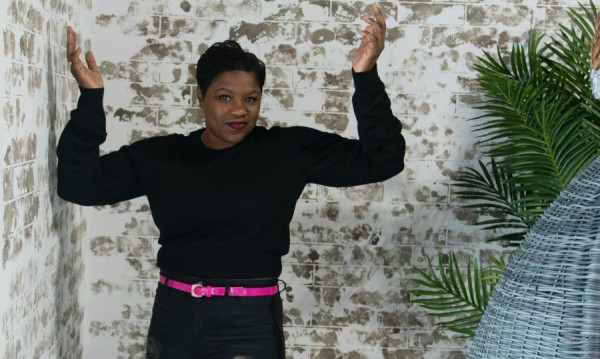I know, it’s not that simple but in my opinion, moisture is essential to minimizing breakage and retaining length in textured tresses. While the balance between protein and moisture is crucial, the addition of protein to a hair care regimen is more important when hair has been chemically altered in some way due to the damage that occurs to the hair structure as part of these processes. For hair that is natural, moisture is the key.
Through misinformation there has been a lot of confusion about what moisture actually is, how to moisturize hair and what ingredients should be included in an effective moisturizer. Products containing emollients such as mineral oil and petroleum, natural oils and butters as well as silicones have been marketed as moisturizers. Women have used these products with no relief to their dry hair. Brittleness has ensued with breaking hair as the result. Because of this we need to take a deeper look into this concept of moisturizing our hair, dissect the formulas and really understand what makes a product an effective moisturizer.
What is moisture?
Moisture is a property of water. Therefore water, and anything that attracts water, will be an effective moisturizer. Hair proteins are attracted to water and hydration contributes to the pliability and elasticity of the hair. Just dousing the hair with water though is not very effective at ensuring that hair stays hydrated. Factors such as porosity play a large role. The more porous the hair, the more the hair allows moisture in, but it loses it just as quickly. Aside from this, effective moisturizing products are extremely important.
What makes a good moisturizer “good”?
A good moisturizer will hydrate and nourish the hair deeply within the hair shaft. Water-based products are necessary. Anything anhydrous or without water such as a 100% oil-based product will not be an effective moisturizer. This is because oils DO NOT moisturize. I’ll repeat, oils do not moisturize. Oils replace lost lipids from the hair, nourish it and can seal in moisture but they do not moisturize. Therefore using an oil-based product with the hopes of moisturizing the hair will be an exercise in futility and will likely result in dry hair. Water-based products will contain water, aloe vera juice or hydrosols as the hydrating ingredient, but they will also contain other ingredients known as humectants.
Humectants can be a curly girl’s best friend
I absolutely love humectants. If they are used correctly, they can effectively improve moisture levels in the hair for days before remoisturizing is necessary. Glycerin is probably one of the most popular and well-known humectants because it’s very effective and relatively inexpensive. It can absorb its own weight in water over 3 days. Misinformation being what it often is, many naturals avoid glycerin like the plague because it makes their hair hard or frizzy. As a result, many natural hair care companies are manufacturing products that are “glycerin free” further compounding the fallacy of the ingredient being detrimental to the hair.
I like to put things in context when it comes to the use of specific ingredients for hair care, their incorporation into a product and the result on the hair. To say that glycerin makes the hair hard or makes it frizzy is relative depending on many things including the relative humidity, the product formulation and other ingredients in the product that can make a huge difference, no matter their percentage inclusion in the formula.
While glycerin is the most well known humectant there are several others. This is where I take issue with some companies that market products as “glycerin free” because they will leave out the glycerin, but add other humectants. These include agave nectar, honey, sodium PCA, sodium lactate, propylene glycol, urea, honeyquat, sorbitol and panthenol to name a few. Certain humectants have more moisture binding capability than others with sodium PCA being at the top and an ingredient like sorbitol being the least moisture binding. However each humectant is unique and brings other properties to a formulation.
Each person’s hair responds differently to an ingredient or product in a unique way. For my thick, kinky curly hair, certain formulations with agave nectar as the primary humectant can make my hair hard and crispy. But my hair responds very well to glycerin with increased softness and moisture.
Humectants and Humidity
In high humidity using humectants can lead to frizz because moisture is taken from the environment into hair resulting in swelling of the hair shaft and poofiness. Humectants should always be used with a moisture sealant.
What are good sealants?
Natural sealants include butters such as shea butter and cocoa butter. In fact cocoa butter is such a good occlusive that it is approved by the FDA to minimize transepidermal water loss by the skin. Mineral oil and dimethicone are two other sealants that are very effective at minimizing water loss once used appropriately.
When it comes to moisturizing hair you’ll definitely need to find which product works for you. Navigating through the abundance of products seems daunting but understanding the ingredient list can help you narrow down your choices. In order to evaluate whether a moisturizer will be good for your hair or not you’ll need to know a few things:
Your hair texture (fine, medium, thick)
Is the product a light lotion or thicker cream?
Is there water in the product to hydrate the hair?
Are there humectants in the product? Where are they in the ingredient list?
Are there any occlusive agents in the product to minimize water loss to the environment?
So what’s the bottom line? Humectants should be a staple in every natural’s product cabinet. They can be used in every season to hydrate and soften the hair. The secret to long-lasting hydration is incorporating humectants into your regimen and using a moisturizer that contains water-loving ingredients. After cleansing and conditioning your hair, moisturize with a water based moisturizer and then seal with oil.
Note that moisturizing and sealing can be done with one product that contains both water-based ingredients and occlusive agents, or with two separate products.
If your hair is fine then you’ll want to use lighter, thinner moisturizing lotions that don’t weigh your hair down, but are effective at moisturizing such as the Earthtones Naturals Curl Quench Coconut Moisture Milk. Lighter oils like fractionated coconut oil or avocado oil can be used over heavier oils such as olive oil.
For thicker hair textures, products with heavier oils and butters are more ideal to effectively soften and moisturize the hair. An example is the Earthtones Naturals Curl Quench Hair Butter. Incorporating these simple but effective strategies into your regimen will result in ultra hydrated kinks, curls and coils.










